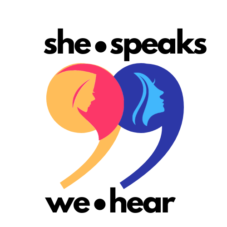
National Hate Crime Awareness Week 2018 took place from 13th – 20th October 2018. Organised by It marks an annual week of action, with the aims to bring people together, to stand with those affected by hate crime, to remember those lost, and support those who need ongoing support. Local authorities (Police and Councils) are encouraged to work alongside key partners, and communities affected by hate crime to tackle local hate crime issues.
The week is used to spread a message of H.O.P.E. Raise awareness of Hate crime and empower communities to report hate crime and work together. All with the ultimate goal of preventing hate crime where possible.
Recent Home Office figures released show that hate crime against Muslims in the UK is rising. It is widely accepted that most victims of Islamophobic hate crime are women, and most of these women are identifiably Muslim. It is against this backdrop that during National Hate Crime Awareness Week, we, She Speaks We Hear held a Roundtable with the Secretary of State Rt Hon James Brokenshire MP, hosted by Al-Khoei Foundation, on British Muslim Women’s experiences of Islamophobia and hate crime. The aim of the Roundtable was to provide a space in which government could listen to British Muslim Women, which would then feed into decision making and policy on hate crime. Sixteen diverse women, from a wide range of backgrounds attended the Roundtable, and shared their shocking experiences of Islamophobia and hate crime.

One woman described how she was spat on following the London Bridge Terror attack in 2017. This incident had made her feel scared but also confused, she was not identifiably Muslim, so why was she targeted? Another woman described how, on the tube she sat next to a man who had been reading an incendiary article in The Times, about Muslims. The man then turned round to the Muslim woman and asked her “what was wrong with Muslims and you?”. After enduring a tirade against her, the woman decided to leave the tube carriage, as she did the man shouted “go back to to where you came from” and she responded “where exactly would you have me go, I was born here”.
One participant broke down in tears as she described how her hijab had been pulled off in the North Eastern City in which she lived. Others described women they worked with who had bacon and alcohol thrown at them, because they were Muslim women who wore either a hijab or the face veil (niqab).
Nearly all of the women had an experience of hate crime to share. Some women described experiencing other forms of Islamophobia, such as in the work place or being asked during recruitment interviews questions about Muslims and the Middle East, both irrelevant to the job they were applying to. So the conversations were heartfelt, passionate and at times difficult to listen to.
The Secretary of State James Brokenshire was unequivocal in stating that no one should have to live in fear or experience hate crime, and that the burden for dealing with Islamophobia and hate crime should not rest solely on Muslim women. He provided clear and powerful assurances that no form of hatred or bigotry would be tolerated.
The discussions, however also focussed on some of the good work being done across communities to tackle negative attitudes towards Muslims, break down myths and bring women from all backgrounds together through business and skills building. We were fortunate to hear from The Khayaal Theatre and their groundbreaking work using theatre to educate young people about Islam and Muslims. We also heard about the work of UpLift Connections, which brings together women who are passionate about business to nurture and empower them financially. Mentoring organisation Muslim Women Connect also spoke about their work in developing young British Muslim women to be confident and further their careers – providing much needed support for women in the workplace, to overcome barriers such as discrimination.
Vlogger and comedian Nabila Pathan aka NabzPat also attended the Roundtable and spoke eloquently about the power of humour to humanise minorities and clap back (sometimes literally!) at offensive stereotypes. She produced a vlog about the event with the help of her trusted characters Aunty Shagufta and Abdul, injecting some humour into an otherwise very serious subject. You can watch the video below.
Communities Secretary @JBrokenshire met a diverse group of female British Muslims at @alkhoei_org to discuss hate crime and the Government’s actions to challenge Islamophobia #HCAP #NationalHCAW 2018 pic.twitter.com/RHJPH0RKx4
— Ministry of Housing, Communities and Local Govt (@mhclg) October 18, 2018
Speaking up about hatred is not easy, and more so doing something about it, whether it is reporting a hate crime or doing something to prevent further hate crime from happening. However all of the attendees of the Roundtable, demonstrated powerfully how important it is to raise awareness of the experiences of Islamophobia and anti-Muslim hatred. They also showed what amazing, resilient and empowered women they are, that despite their experiences they persevered to tackle and address negative attitudes and stereotypes of Muslims.
